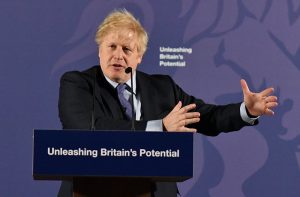 The Government wishes to see a future relationship based on friendly cooperation between sovereign equals for the benefit of all our peoples. There is complete certainty that at the end of 2020 the process of transition to that relationship will be complete and that the UK will have recovered in full its economic and political independence. The Government remains committed in all circumstances to securing all those benefits for the whole of the UK and to strengthening our Union.
The Government wishes to see a future relationship based on friendly cooperation between sovereign equals for the benefit of all our peoples. There is complete certainty that at the end of 2020 the process of transition to that relationship will be complete and that the UK will have recovered in full its economic and political independence. The Government remains committed in all circumstances to securing all those benefits for the whole of the UK and to strengthening our Union.
The question for the rest of 2020 is whether the UK and the EU can agree a deeper trading relationship on the lines of the free trade agreement the EU has with Canada, or whether the relationship will be based simply on the Withdrawal Agreement deal agreed in October 2019, including the Protocol on Ireland / Northern Ireland. In either event the UK will be leaving the single market and the customs union at the end of this year and stakeholders should prepare for that reality.
The Government will work hard to achieve a balanced agreement that is in the interests of both sides, reflecting the wide range of shared interests. Any agreement must respect the sovereignty of both parties and the autonomy of our legal orders. It cannot therefore include any regulatory alignment, any jurisdiction for the CJEU over the UK’s laws, or any supranational control in any area, including the UK’s borders and immigration policy.
This points to a suite of agreements of which the main elements would be a comprehensive free trade agreement covering substantially all trade, an agreement on fisheries, and an agreement to cooperate in the area of internal security, together with a number of more technical agreements covering areas such as aviation or civil nuclear cooperation. These should all have governance and dispute settlement arrangements appropriate to a relationship of sovereign equals.
Future cooperation in other areas does not need to be managed through an international Treaty, still less through shared institutions. The UK will in future develop separate and independent policies in areas such as (but not limited to) the points-based immigration system, competition and subsidy policy, the environment, social policy, procurement, and data protection, maintaining high standards as we do so. Cooperation on foreign affairs and related issues is of course likely to be substantial, but does not in itself require a joint institutional framework.
In its negotiations with the EU, the Government will be acting on behalf of the UK Crown Dependencies and Overseas Territories: the whole UK family.
The UK proposes to agree similar arrangements with the EFTA states.
Further information is set out below. Unless otherwise stated, it should be assumed that the UK’s aspiration and level of ambition is to reach agreement on provisions which are at least as good as those in the EU’s recent trade agreements, such as those with Canada or Japan.






Recent Comments